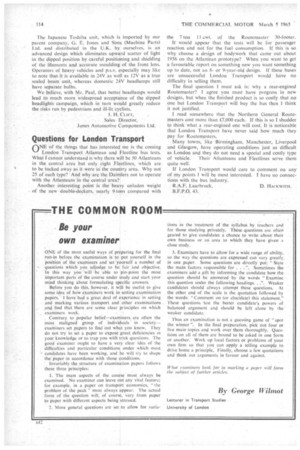THE COMMON ROOM
Page 116

If you've noticed an error in this article please click here to report it so we can fix it.
Be your own examiner
ONE of the most useful ways of preparing for the final run-in before the examination is to put yourself in the position of the examiners and set yourself a number of .questions Which you .adjudge to be fair, and objective.
tn this way yOu be able to pin-point the most important parts of the course under study and start your mind thinking about formulating specific answers. •
Before you do this, however, it will be useful to give some idea of how examiners work in setting examination papers. I have. had a great deal of experience in setting and marking variOns transport and other examinations and.:find that there are some clear principles on which examiners work.
.. Contrary to popular beliefexarniners, are often the most maligned group of individuals in society-'examiners set papers to find 'out what you know. They do not try to set a paper to expose great, deficiencies tn your knowledge or to trap you with trick questions. The good examiner ought to have a very clear idea of the difficulties and particular conditions under which most candidates have been working, and he will try to shape the paper in accordance with those conditions. . Invariably the structure of examination papers follows these three principles: 1. The main aspects of the course must always be examined. No examiner can leave out any vital feature: for example, in a paper on transport economics, "the problem of the peak must always appear. The actual form of the question will, of course, vary from paper to paper with different aspects being stressed.
2. More general questions are set to allow for varia tions in the treatment of the Syllabus by teachers and for those studying privately. These questiOns are often geared to give candidates a chance to write about their own business or an area to which they have given a close study.
3. Examiners have to allow for a wide range of ability, so the way the questions are expressed ear(vary greatly in one paper. Some questions are directly put: State the main factors responsible for . . "a Sometimes the examiners add aagift by informing the candidate how the question should be answered by the words "Examine Ellis question under the following headings...". Weaker candidates should always attempt these questions. At the other end of the scale is the quotation followed by the words: Comment on (or elucidate) this statement." These questions -teat the better candidate's powers of balanced argument and should he left alone by the weaker candidate; • Thus an examination is not a guessing game of "spot the winner ". Irt the final preparation, pick out four or five main topics and work over them thoroughly. Questions on all of them are bound to be asked in one form or another: Work up local factors or problems of your own firm so that you can apply a telling example. to drive home a principle, Finally, choose a few quotations and think out arguments in favour and against.
What examiners look for in marking a paper will form the subject of further articles.
By George Wilmot
Lecturer in Transport Studies University of London




























































































































































